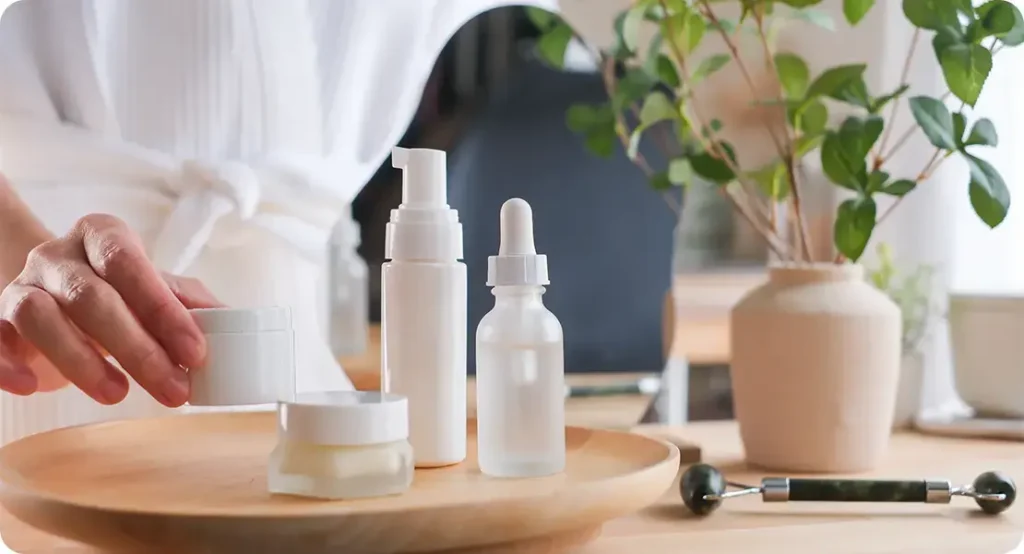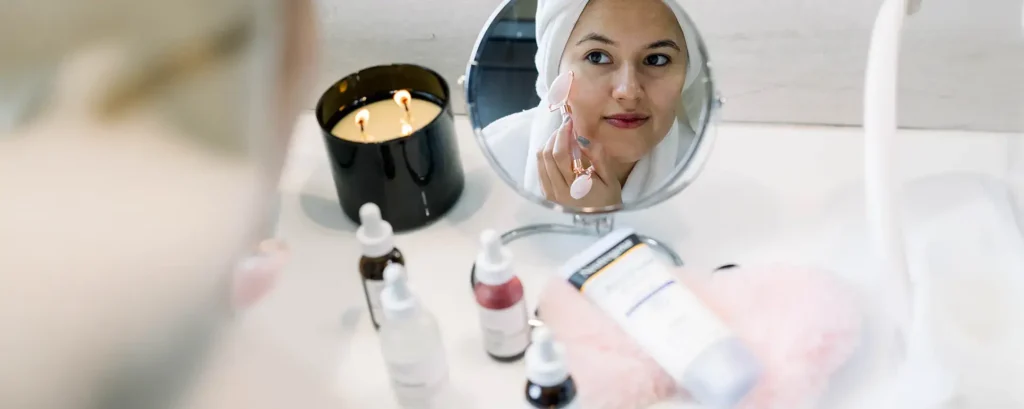Have you ever stood in a shop aisle, scanning the endless rows of skincare products and wondering if any of them will genuinely help your skin? If so, you’re definitely not alone. Many people go through a cycle of trial and error buying serums, cleansers, and creams that promise dramatic results, only to be disappointed. You might have spent a small fortune, followed every trendy routine, and still not seen the changes you were hoping for.
That’s where medical-grade skincare comes into the picture. It’s not just a buzzword or a marketing trend it’s a completely different approach to treating your skin, one that’s backed by science, higher concentrations of active ingredients, and, often, the guidance of professionals.
In this guide, I’ll walk you through everything you need to know: what makes medical-grade products different from the ones you find at the chemist, why you might want to make the switch, how to introduce them safely into your routine, and when it’s time to consult a dermatologist. Whether you’re dealing with stubborn acne, premature ageing, pigmentation issues, or just want to give your skin the best possible care, this article is here to help you feel confident, informed, and empowered to make choices that truly benefit your skin’s long-term health.
What Exactly is Medical-Grade Skincare?
Before you decide whether medical-grade skincare is right for you, it’s important to understand what the term actually means and how it differs from the skincare products you’re probably used to seeing on store shelves.
In simple terms, medical-grade skincare refers to formulations that contain higher concentrations of active ingredients the components that actually drive visible results. These aren’t your average moisturisers or cleansers. Instead, they’re developed through rigorous scientific research and are often the result of collaboration between dermatologists, chemists, and pharmaceutical labs.
One of the biggest differences is how these products work. Over-the-counter (OTC) skincare products are designed for mass-market use, meaning they’re typically gentler and sit mostly on the surface of your skin. They’re meant to maintain skin health and improve its appearance over time, but usually in a mild, incremental way.
Medical-grade skincare, on the other hand, is formulated to go deeper. The molecules in these products are often engineered to penetrate into the lower layers of the skin, where real transformation happens think improved collagen production, reduced pigmentation, or controlled inflammation.
Because of their potency, these products are usually not available in high street stores. Instead, they’re sold through authorised medical professionals, such as dermatologists or skincare clinics. This ensures that you’re not just using a strong product blindly you’re getting something that’s matched to your skin type, concerns, and goals.
Another key difference is regulation. Many medical-grade brands must meet strict standards to prove their efficacy and safety, meaning the claims they make are more likely to be backed by clinical studies and real-world results. That’s not always the case with standard OTC products, where marketing often overshadows performance.
How Medical-Grade Skincare Differs from Over-the-Counter Products

If you’re wondering whether medical-grade skincare is just a clever marketing term, I can assure you it’s more than that. Here are some key differences you’ll notice:
1. Higher Concentrations of Active Ingredients
Medical-grade products often contain higher percentages of active ingredients like retinoids, antioxidants, peptides, or hydroquinone. These levels are significantly higher than what you’ll find in OTC products, and that’s why they can deliver more noticeable results. Since these ingredients are more potent, they can treat issues like pigmentation, ageing, or acne more effectively and in less time.
2. Scientifically Validated Formulas
Every product in a medical-grade line is backed by rigorous studies and clinical trials. You can expect evidence-based claims, not just marketing hype. Brands that produce medical-grade skincare invest in peer-reviewed research, ensuring that each formulation is both safe and effective for targeted skin concerns.
3. Enhanced Skin Penetration
Many OTC products only work on the skin’s surface. In contrast, medical-grade products are formulated to reach deeper layers where collagen is produced and cellular turnover occurs. This deeper penetration allows for long-term improvements rather than just surface-level fixes, promoting healthier, more resilient skin over time.
4. Professional Guidance
Because these products are potent, you’ll usually need guidance from a dermatologist or trained skincare professional. This reduces your risk of irritation or misuse. A personalised skincare plan ensures the right combination of products and dosages, tailored to your skin type and concerns, which increases the likelihood of successful outcomes.
5. Regulated Quality Standards
Manufacturers must comply with stricter standards to ensure product consistency and stability. These regulations often require third-party testing, sterile production environments, and detailed documentation. As a result, the quality control behind medical-grade products tends to be far more robust than that of drugstore options.
If you’ve been underwhelmed by store-bought skincare, this may be exactly the step your routine needs. Medical-grade products combine science and results-driven performance to help you finally achieve the skin improvements you’ve been striving for.
Is Medical-Grade Skincare Right for You?
Medical-grade skincare isn’t necessarily for everyone. These products contain potent, active ingredients that deliver real results but they can also cause irritation if not chosen or used properly. People with very sensitive skin may react strongly, especially without professional guidance. That’s why I always recommend starting with a personalised assessment from a qualified dermatologist or skincare expert.
You might be a good candidate for medical-grade skincare if you:
- Have persistent acne that hasn’t improved with OTC products
If drugstore cleansers and spot treatments aren’t cutting it, medical-grade options with stronger actives like benzoyl peroxide, retinoids, or salicylic acid might be the next step. - Struggle with pigmentation or melasma
Uneven skin tone, dark spots, or hormonal pigmentation can be stubborn. Medical-grade formulas can include prescription-strength ingredients like hydroquinone or tranexamic acid that target these concerns more effectively. - Want to treat fine lines, wrinkles, or other signs of ageing
Over-the-counter anti-ageing creams can only go so far. Medical-grade products often contain higher concentrations of retinol, peptides, or growth factors that stimulate collagen production and cellular renewal. - Need targeted treatment for rosacea or chronic redness
Sensitive or inflamed skin requires precision care. A dermatologist can help you select medical-grade products that reduce inflammation without triggering flare-ups. - Want evidence-based results rather than cosmetic cover-ups
If you’re tired of buying skincare that overpromises and underdelivers, medical-grade skincare offers results rooted in clinical research not just good marketing.
If any of these apply to you, it might be time to explore a more advanced, results-driven approach to skincare. With the right products and professional support, you could finally see the transformation you’ve been hoping for.
Benefits of Switching to Medical-Grade Skincare

When you switch to medical-grade skincare under professional supervision, you’re not just upgrading to fancier packaging or trendier labels. You’re investing in products that can actually change how your skin behaves and looks over time.
Here are some of the benefits I’ve seen first-hand in clients:
- Improved Texture and Tone: High-potency actives can help smooth rough patches, fade pigmentation, and even out your complexion.
- Greater Clarity: Medical-grade treatments can help unclog pores and reduce acne.
- Reduced Signs of Ageing: Ingredients like retinoids and peptides help promote collagen, reducing fine lines and wrinkles.
- Faster, Measurable Results: Because of the concentration and delivery systems, you’re likely to see results more quickly than with OTC skincare.
- Tailored Regimens: A dermatologist can create a plan based on your skin’s unique needs.
If you’ve spent years trying products without success, these benefits can feel transformative.
How to Start with Medical-Grade Skincare
If you’re feeling excited to try medical-grade skincare, I’m glad. But it’s important to start carefully so you don’t overwhelm your skin or waste your investment. Here’s how I recommend getting started:
1. Book a Consultation
Always begin by seeing a qualified dermatologist or skincare professional. They can assess your skin, discuss your goals, and recommend the right products for you. This step is crucial because using the wrong formulation even a high-quality one can do more harm than good. A professional will customise a plan that fits your skin type, lifestyle, and concerns.
2. Start Slowly
Your skin may need time to adjust to stronger actives. You might begin using a product just a few times a week, gradually increasing frequency as your tolerance builds. Jumping in too quickly can cause irritation, dryness, or flaking especially with ingredients like retinoids or acids. Think of it as building skin strength over time.
3. Use Sun Protection
Many medical-grade products make your skin more sensitive to UV damage. You’ll need to be diligent about wearing broad-spectrum SPF every day. This protects your skin not only from sunburn but also from further pigmentation and premature ageing, ensuring the products can do their job effectively.
4. Monitor Your Progress
Keep a simple journal to track any changes. If you experience redness, peeling, or irritation, contact your dermatologist. Documenting your routine and how your skin reacts can help you and your skincare provider make necessary adjustments for better results.
5. Be Patient
It can take weeks or even months to see the full benefits. Consistency is key. Medical-grade skincare works on a cellular level, which takes time but the long-term improvements in tone, texture, and clarity are worth the wait. Avoid the temptation to add too many products at once or jump to conclusions.
Common Ingredients in Medical-Grade Skincare
If you’re curious about what ingredients you might encounter in medical-grade skincare, here are some of the most common and most effective actives used to treat a variety of skin concerns:
- Retinoids (Vitamin A derivatives):
These powerhouses help accelerate cell turnover, unclog pores, and improve skin texture. They’re also widely used to treat acne, fade pigmentation, and reduce fine lines. Prescription-strength retinoids like tretinoin are only available through a dermatologist. - Vitamin C (Ascorbic Acid):
Known for its brightening and antioxidant properties, Vitamin C helps even out skin tone and protect against free radical damage caused by pollution and UV exposure. In medical-grade formulas, it’s often stabilised and paired with complementary ingredients for deeper absorption. - Peptides:
These short chains of amino acids support collagen production, improve skin firmness, and help smooth fine lines. They’re especially useful in anti-ageing formulations, helping to restore skin’s structure over time. - Hyaluronic Acid:
A hydration hero, hyaluronic acid attracts and retains moisture in the skin, giving it a plumper, smoother appearance. Medical-grade products often contain multiple molecular weights for deeper penetration and longer-lasting hydration. - Hydroquinone:
Used under professional supervision, hydroquinone helps lighten hyperpigmentation, melasma, and age spots by inhibiting melanin production. It’s one of the most effective ingredients for addressing stubborn discoloration. - Alpha Hydroxy Acids (AHAs):
AHAs like glycolic acid and lactic acid gently exfoliate the skin’s surface, removing dead cells and revealing a brighter, smoother complexion. In medical-grade skincare, they’re often used in higher concentrations for more noticeable results.
Not every ingredient will suit every skin type or concern. That’s why having a professional guide you through the selection and application process is so valuable they’ll help you avoid irritation, product clashes, or wasted effort.
Myths About Medical-Grade Skincare
There’s a lot of confusion and misinformation about medical-grade skincare, so let’s clear up a few common myths:
Myth 1: It’s Just Marketing Nothing Special About It
Reality: These products have clinical-grade formulations that can’t be matched by regular OTC brands. They’re often developed in collaboration with dermatologists, using high concentrations of active ingredients and advanced delivery systems that go beyond what’s available in drugstore lines. The research and testing that go into these formulas set them apart from cosmetic skincare.
Myth 2: You’ll See Instant Results
Reality: While some benefits happen quickly (like hydration or glow), improvements in tone, texture, and pigmentation often take time. Medical-grade skincare works at a deeper, more reparative level, which means lasting results but not overnight miracles. Trust the process and stay consistent with your routine.
Myth 3: It’s Only for Severe Skin Problems
Reality: Anyone who wants more effective preventative care can benefit. You don’t have to wait for a major issue like acne, melasma, or wrinkles to start using medical-grade products. In fact, starting earlier can help maintain healthier, more youthful skin in the long run.
Myth 4: It’s Always Irritating
Reality: With proper guidance and a gradual approach, many people tolerate medical-grade skincare very well. When introduced correctly often one product at a time and with professional supervision most users experience minimal side effects. In many cases, the right formulation can even help calm irritation from previous OTC products.
When to Consult a Dermatologist
I believe that everyone considering a switch to medical-grade skincare should speak with a professional first. These products are powerful and targeted, which is why expert guidance is so important. If you’re dealing with any of the following issues, it’s essential to book a consultation:
- Persistent acne that hasn’t responded to OTC products
Chronic breakouts can be more than a cosmetic issue they may point to hormonal imbalances or underlying skin conditions that require prescription-strength solutions. - Severe sun damage or uneven pigmentation
Hyperpigmentation, dark spots, or sun-induced ageing are difficult to treat with store-bought products. A dermatologist can recommend clinically proven ingredients like hydroquinone, retinoids, or tranexamic acid that actually work. - Rosacea or chronic redness
Medical-grade skincare can help manage inflammation, but some ingredients may trigger flare-ups if not selected carefully. Professional advice ensures you’re using gentle, effective products that support rather than irritate your skin. - Significant signs of ageing
Fine lines, wrinkles, loss of firmness, and dullness can be addressed more effectively with high-potency actives like peptides, growth factors, and prescription-grade retinoids all of which a defits of Switching to Mediermatologist can prescribe and guide you through. - A history of skin sensitivity or allergies
If your skin reacts easily or unpredictably, trying new products can be risky. A dermatologist can help you patch-test, adjust concentrations, and avoid irritants, keeping your barrier intact while still seeing results.
Even if you don’t have a major problem, a dermatologist can help you avoid common pitfalls like over-exfoliating or using clashing ingredients and design a regimen that fits your skin type, goals, and lifestyle.
Final Thought: Your Journey to Healthier Skin Starts Here
Switching to medical-grade skincare is a big decision and one that can genuinely change your skin for the better. If you’re feeling ready to take the next step, I’m here to encourage you.
You don’t have to figure it all out alone. You can get in touch with us to book a consultation with one of our expert dermatologists if you’d like personalised advice on how to start safely and effectively.
References:
- Ortonne, J.P. and Bissett, D.L., 2008.
Latest insights into skin hyperpigmentation. Journal of Investigative Dermatology Symposium Proceedings, 13(1), pp.10–14. - Mukherjee, S. et al., 2006. Retinoids in the treatment of skin aging: an overview of clinical efficacy and safety. Clinical Interventions in Aging, 1(4), pp.327–348.
- Zasada, M. and Budzisz, E., 2019. The role of vitamin C in anti-aging therapy. Dermatologia Estetyczna, 21(3), pp.165–173.
- Al-Niaimi, F. and Chiang, N.Y.Z., 2017. Topical peptides in skin rejuvenation. Clinics in Dermatology, 35(4), pp.344–349.
- Farris, P.K., 2014. Topical vitamin C: a useful agent for treating photoaging and other dermatologic conditions. Dermatologic Surgery, 40(3), pp.314–327.
